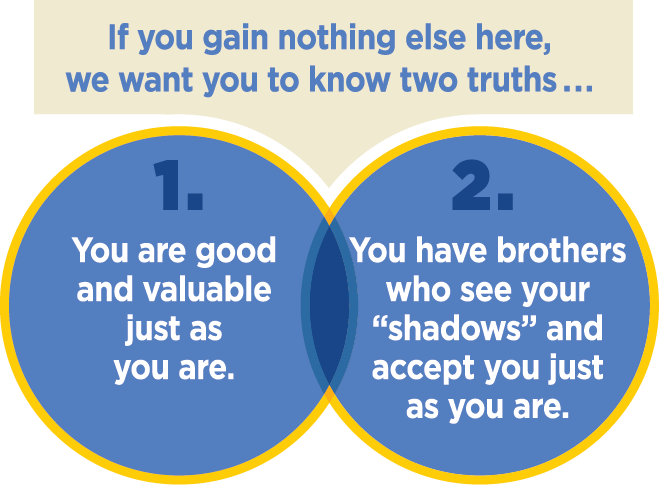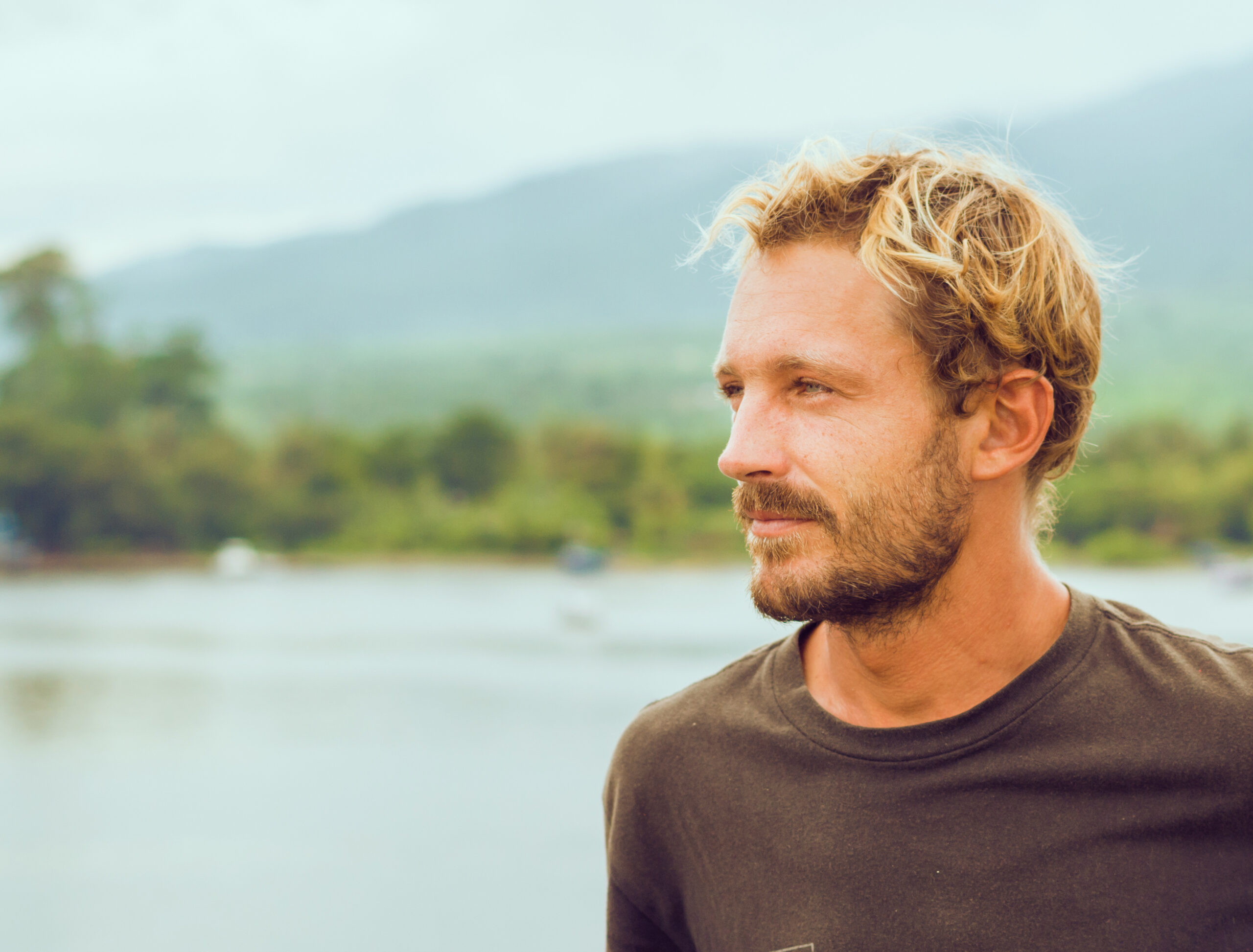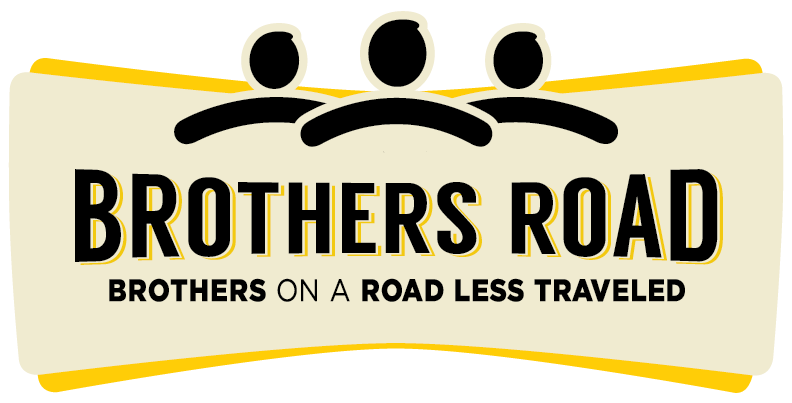Our Journey
We are on a journey of self-discovery to explore and address underlying issues and embrace our authentic masculinity. The core of this journey we call “M.A.N.S. Work.”
Love & Accept Yourself
Self-acceptance is the foundation for building a better, happier you.
You Are Good and Valuable, Just As You Are — Today
Everyone needs to feel loved and accepted by people who are important to them. In fact, that’s a core human need. But it ultimately doesn’t matter how much others like and accept you if you can’t like and accept yourself.
This, too, is a core need. (See: Core Needs: A man needs to genuinely like, accept, and respect himself just as he is.)
For men who experience unwanted same-sex attractions, this core need can easily get derailed. They may experience shame, self-hate and self-blame. They may hide their true selves, believing that if others really knew them, they would be rejected. They may think they have to change who they are first, before others can like or accept them.
But thoughts and feelings like these can only inflict pain.
The irony is, self-acceptance is the foundation for building a better, happier you. American psychologist Carl Rogers famously said, “The curious paradox is that when I accept myself just as I am, then I can change.”
We teach at Journey Into Manhood:

Make Peace With Your SSA
For SSA men, we begin by coming to peace with our same-sex attraction. We may try to understand it. We may try to manage it or minimize it or even “overcome” it (whatever that means). But the one thing we cannot do is vilify it. SSA is not our enemy. It’s not our “battle” to fight or our “cross to bear.” It doesn’t require a “cure.”
SSA may, however, be our teacher, if we allow ourselves to learn from it. It may have a lot to reveal to us about ourselves and any unmet needs, unhealed wounds, or other unfinished “work.”
First, we recognize all that is positive, healthy and affirming about our same-sex attractions. For instance, as SSA men, we may have have an innate drive to pursue or develop:
- Meaningful friendships and brotherly love
- Connection, belonging and community
- Appreciation for healthy masculinity
We may naturally be more:

- Creative and artistic
- Spiritual (especially when it comes to calling on God to help us through this confusion!)
- Emotional and sensitive
- Empathic and relational
Allow yourself to feel grateful for these gifts (and they really are gifts!).
You may realize that what may need to change, if anything, is not your same-sex attraction itself but
- your distress and inner turmoil about your SSA
- and possibly any unhealthy, harmful or distressing thoughts and behaviors (such as same-sex lust, perhaps).
In this way, you may be like anyone else who has some personal-improvement work to do. There is nothing wrong with you. There may, however, be something harmful about some of what you think or do. That doesn’t make you a bad person. It just makes you human.
Challenge Harmful Thoughts, Feelings and Behaviors
You can’t “fix” self-esteem through willpower. You can’t simply choose to feel better about yourself. We learn to love, accept and respect ourselves by:
- challenging self-critical thoughts and changing our inner self-talk and hurtful beliefs about ourselves
- healing old wounds and painful feelings that have caused us to feel bad about ourselves
- and changing any self-destructive behaviors.
Challenge Your Self-Critical Thoughts
The way you perceive yourself and others, and the beliefs you form about these perceptions, create the reality in which you live your life.
For example, whether you see other men as safe or threatening, honorable or suspect, accepting or rejecting, your beliefs create the world of men as you experience them.
Whether you see women as controlling and demanding or relatable and kind, your beliefs determine whether you will want to draw closer to them or push them away.
Whether you see yourself as equal to other people or somehow defective and less than them, those ideas become the truth in your inner world.
In Brothers Road communities, we refer to our perceptions or judgments about ourselves or others as “the stories I tell myself.” Because they really are just the stories that we create in our heads to make sense of the world around us.
Now here’s the good news: Our thoughts, beliefs, perceptions or judgments are really quite malleable. In fact, we teach at Journey Into Manhood:
Change your beliefs … and you change the world as you know it.
Challenge the stories you tell yourself about yourself and the people around you … and you change the inner world in which you live.
A major focus of our peer-led Journey Into Manhood program is to invite participants to look closely at and then challenge their beliefs, judgments and perceptions of other men, of manhood, and of themselves as a man. When they sincerely do that, they often find that they are, in fact, already “man enough,” already a man among men, after all.
![]() Resource: See the “Challenging Distressing Beliefs” questions and worksheet in our Tools & Resources section.
Resource: See the “Challenging Distressing Beliefs” questions and worksheet in our Tools & Resources section.
![]() Resource: One of our favorite sources in our community for challenging distressing internal stories is “The Work” of Byron Katie, and her book, Loving What Is.
Resource: One of our favorite sources in our community for challenging distressing internal stories is “The Work” of Byron Katie, and her book, Loving What Is.
Heal Old Wounds and Painful Feelings
Often, low self-esteem or a sense of inadequacy is driven by a history (real or perceived, it doesn’t matter) of rejection, betrayal, sometimes brutal criticism and even abuse. These experiences can result in crippling shame, fear of trusting others, and an inability to think of ourselves as having any inherent value beyond our accomplishments or what we can do for others. They can take a terrible toll on our self-worth and make it seem impossible to restore our innate sense of value.
Truthfully, healing this kind of pain can be long and difficult work. There are no shortcuts. It usually entails counseling or intensive emotional-healing weekends or comparable efforts, sustained over time.
But the good news is that healing is possible. Eventually, we have found a new sense of self-compassion, self-respect, and self-worth through:
- the loving and patient support of others,
- our own willingness to courageously face and heal the past
- and, often, an eye-opening encounter with the love and grace of God.
![]() Resource: Journey Into Manhood has been a turning point in countless men’s lives for (re)discovering their innate value and self-worth.
Resource: Journey Into Manhood has been a turning point in countless men’s lives for (re)discovering their innate value and self-worth.
Align Your Behaviors With Your Values
Learning to accept and love yourself requires a healthy, encouraging thought-life as well as significant emotional healing from past pain.
But it also requires us to change any behaviors that may be out of out of sync with our values. We could never fully like and respect ourselves as long as we kept doing things we regretted or that hurt ourselves or others.
This kind of change usually starts with a personal inventory (a “searching and fearless moral inventory,” the Twelve Steps call it): “What am I doing or not doing that may be harming myself or others?”
- You may need to bring your sexual life in line with your values or your spiritual life. When you’re “clean and sober,” you’ll see yourself in a whole new light. You’ll almost certainly like yourself a lot more.
- You may need to reach out and build new friendships and create a vibrant support network. People who like themselves thrive in the company of other happy, healthy people.
- You may need to discover a renewed sense of purpose for your life. People feel better about themselves when they are serving a cause greater than themselves.
- Or it may be time to start working the life-changing “M.A.N.S. principles” — healthy masculinity, courageous authenticity, genuine needs fulfillment and humble surrender to God’s will.
Consciously working to live a more value-centric, purposeful life will bring you a sense of self-respect and self-worth unlike anything you otherwise could ever know.
Our Stories
I used to fight SSA and sex addiction in suppressing the urge and hating myself if I failed. During the JiM weekend I learned to accept myself and love myself as I am. I have experienced that this is a far better basis to come to terms with my SSA, which is still a part of me, but does not dominate me anymore.
The biggest thing I got out of Journey into Manhood was learning how to love and value myself, just as I am. Through my emotional healing work, I was able to let go of the shame and self-hatred that had been weighing me down for years, and this allowed me to let true joy and peace into my heart.
I have learned that I have to love myself in my own skin. It has taken JiM and some local friendships and others who have been through my same experiences to help me to come out of my shell and experience life. Therapy and our local MANS chapter helped me get there.
Through Journey into Manhood and Journey Together, I became aware of subtle negative beliefs I had about myself that had a powerful control over how I viewed myself as a man and as a competent human being more generally. Challenging those beliefs has helped me to get rid of some of them and diminish the influence of others.
I recognized and challenged judgments I made about myself — judgments that a loving God would never say about His son (me).
Other factors that have helped me to build healthier self-esteem have included making an effort to appear and feel well groomed, exercising, challenging myself to do new things, and using the talents God has given me.
Also, as I’ve gotten to know men whom I admire, I’ve come to see their imperfections and insecurities. This in turn has helped me to feel okay with my own imperfections and insecurities.
One of the most life-changing experiences I took from Journey Into Manhood was learning to love and accept myself. It came in pieces, and it took time and self-coaching, but today I am a completely different man. I feel confident and at peace with who I am. I can see attractive guys without feeling depressed or lustful. Old ways of thinking try to creep back in, but with vigilance, I’m maintaining a state of mind that has brought me joy I didn’t know I could experience.
Realizing I was not alone in many of the things I carried shame about helped me to release the shame and accept myself where I was at.
The more I pushed away who I was, the more internally miserable I became. It kept me shy and angry. It kept me from manifesting anything good about myself to the world around me. As I’ve come to love and accept myself for who I am, the details of who I am really don’t matter. I just see myself as good, and with that belief I can accomplish so much more.
I am now living the way that I want, and I am the happiest I have been in a very long time. After lots of work, my SSA no longer has the intense grip that it once had on me.
Therapy and healing weekends have not only helped me to see my problems differently but to see myself as someone who is good and valuable and acceptable just as I am — even unchanged.
My efforts never were to change my sexual orientation but to be happy as the man I am — the man God created me to be. I’ve seen an increase in my self-esteem and renewed confidence. I have much more joy in my life. My love for my wife has increased a lot. I’m more secure and confident as a father, too.
Emotionally, I am a much healthier person. I used to have really deep emotional lows, to the point that I considered suicide several times. Now, I am happy. I like myself, where before I did not. My self-esteem is much greater than it has ever been. I feel respected and appreciated by men, where before I only felt merely tolerated (or downright rejected) by them. My marriage is very strong. I love her more deeply than ever. I feel masculine; before I did not. I feel like an adult; before I felt like an 8-year-old boy stuck in a 48-year-old body of a man.
After 50+ years of body shame, I accepted my male body and liked my body. This was significant to change the envy issues that I had for other men — which made them seem “other” than I was. I felt like I was part of the “man club,” not an inadequate reject.
I am no longer ashamed of my life. For years I felt that the only way I would be accepted was to have sex with men. I did not have a real group of friends. Guys would usually get close only when they wanted something. There were some guys I would talk to at bars, but we had no relationship outside the bars.
Through JiM I realized I was a full man. I did not need another man to complete me. I realized I did not have to offer myself sexually to get male attention. At JiM, I made authentic connection with other men. For the first time I had real hope for myself. I started to accept myself and wanted to grow. I have worth. I started to learn what true connection with men is. I left with the knowledge that I am WORTHY. I have value.
